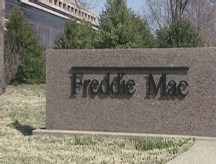Fed worried about inflation and slowdown
Latest Fed minutes show concerns about price pressures and a weaker economic outlook. Still, the Fed hinted its likely next move may be to raise rates.
NEW YORK (CNNMoney.com) -- The Federal Reserve expressed concern about both greater inflation risks and a slowdown in the economy that could extend into next year, according to minutes of its most recent meeting.
The central bank said it is most likely that its next move will be to raise interest rates. The Fed indicated that the timing of such a move is uncertain, however, given the conflicting pressures on the Fed to both spur economic growth and keep prices in check.
But since that meeting, expectations of a rate hike in the next few months have dipped significantly as oil prices have fallen and the dollar has rallied.
In addition, the Fed also indicated in the minutes that its staff lowered its forecast for economic growth in the second half of this year and into 2009. The Fed is now looking for a pickup in the economy in the second half of next year.
The central bank's policy-makers left the Fed's key overnight lending rate at 2% following its August 5 meeting, the second straight meeting at which the rate was left unchanged.
Prior to that, the Fed cut rates seven times between September 2007 and April in an effort to address weakness in the economy and problems in financial markets.
One member of the Federal Open Market Committee, Dallas Fed President Richard Fisher, dissented at both those meetings, arguing that rates needed to be raised in an effort to combat inflation pressures.
While Fisher has been the sole vote for hikes the past two meetings, the minutes said that "a number of participants" voiced concern about inflation pressures.
The minutes also suggested that some Fed members think it must move to raise rates sooner than now assumed by markets if it is to head off a return of inflation.
But according to the minutes, most members do not believe current rates are too low "given that many households and businesses were facing elevated borrowing costs and reduced credit availability."
Since the meeting the price of oil and other commodities have tumbled further. There have also been additional concerns about the future of Fannie Mae (FNM, Fortune 500) and Freddie Mac (FRE, Fortune 500), the two government-sponsored mortgage finance firms that are the prime source of funding for banks and other home lenders.
Fed Chairman Ben Bernanke acknowledged the commodity price decline in a speech Friday and said he expects price pressures to ease later this year as the economy slows.
But he also warned that storms in financial markets have not yet ended. That was taken as the clearest signal yet that the Fed will keep its federal funds rate on hold at its September 16 meeting and probably for the remainder of the year.
Stuart Hoffman, chief economist for PNC Financial Services Group, said that given Bernanke's recent comments, the minutes had few surprises. He said while it's clear there is a vocal minority of policymakers who would move to raise rates to combat inflation, the majority isn't prepared to do so just yet.
"If anything I read this as the vast majority preaching patience as far as inflation," he said. "The Fed does seem to be signaling their next move is up. But to me the odds of even a December hike are still pretty slim."
The federal funds rate is used as a benchmark to determine how much interest consumers and businesses pay for various types of loans. ![]()



